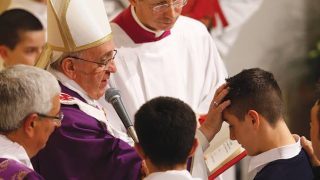
THE EYES OF LOVE AND MERCY
HOMILY FOR THIRTY-FIRST SUNDAY IN ORDINARY TIME, YEAR C. Readings: Wisdom 11:22-12:2; Psalm 145; 2Thessalonians 1:11-2:2 and Luke 19:1-10.
Today’s liturgy invites us to imitate God in his love and compassion for all and give opportunity to those who desire to amend their way of life for good. The readings express God’s love for all he has created and Christ expressed this with the eye of love and mercy towards Zacchaeus, whom the world looks to with hatred because of his deeds. The liturgy questions our attitude on how we see others. Do we see others as condemned or with eyes of redemption? Do we look at others with eyes of love and mercy or with hatred?
In the first reading, the book of Wisdom presents the love and mercy God has for all his creatures. It says, “But you are merciful to all, for you can do all things and you overlook men’s sins, that they may repent” (Wis. 11:23). In spite of the weakness and wickedness of man, and the gravity of our unfaithfulness, God continues to show mercy. A famous Nigerian artist, Moses Bliss will say in his song, “Even when I fall your hand, you still dey hold my hands, lover of my soul, you no dey break my heart, I will sing about your mercy, I will sing about your grace…”
It is in God’s nature to be merciful. That is why we belief to err is human and to forgive is divine. Each time we show mercy to others, we become more like God. As we contemplate his mercy, He reminds sinners of their transgressions/sins so that they may repent and return to him. In this reading, Wisdom invites us to be like God in compassion and mercy when he says, “Therefore you correct little by little those who trespass, and remind and warn them of the things wherein they sin, that they may be freed from wickedness and put their trust in God” (Wis. 12:2). At this we see a merciful God that gives us the opportunity to retrace our steps. What are we waiting for?
In the gospel of today, we see a wicked man retracing his steps and was freed from his wickedness. It is the story of Zacchaeus, who was seen as a traitor, thief and a chronic sinner because of his office as chief tax collector. He was characterized of being short and wicked. Being a chief tax collector of a wealthy community almost guaranteed prosperity, and Luke specifies that Zacchaeus was rich (v.2) and the Jews despise tax collectors as mercenaries and thieves (working with the Romans to collect taxes and pay a substantial fee for their franchise).
He has probably heard of Christ visiting the Levi (Mathew the tax collector) and so desired to see Christ but he could not because of the crowd and because he was short. “So he ran on ahead and climbed up into a sycamore tree to see him… (v.4). his behavior in this instance is remarkable. His office as chief tax collector required that people respect his power and comply with his directives. His position demands dignity and authority. However, before Christ he saw his office as nothing, but rather exposes himself to sharp elbows as he pushes through the crowd. Being a short man, he invites to himself, ridicule by climbing a tree, which calls attention to his short stature.
Seeing his effort, Christ said to him, “Zacchaeus, make haste and come down; for I must stay at your house today” (Lk. 19:5). How surprised and honored he must feel to have Christ in his house! Why will Christ honour a man like Zacchaeus whom the people saw as a traitor, collaborating with the Romans and characterized as a wicked man? While they saw darkness and condemnation in Zacchaeus, Christ saw him as an object of redemption with the eyes of love and mercy, and so went in to dine with him and the people murmured against Christ. Interestingly, just as Zacchaeus exposed himself to ridicule by climbing the sycamore tree, so Christ exposed himself to criticism by entering Zacchaeus’ house. They don’t want him to honour a man whom they regarded as their enemy.
Luke has a special way of using the concept of Christ ‘entering his house.’ The house in this context is a heart of a sinner and Christ’s entrance to it brought salvation to the sinner. At this point of conversion, Zacchaeus volunteered to give half of his wealth to the poor and to make fourfold restitution to anyone whom he has defrauded, similar to what Christ told the rich ruler to go sell his property and give the money to the poor (Lk 18:18-30). Zacchaeus did not make this offer to win Christ approval, but to show his gratitude. He is not trying to win salvation but instead, responding to the presence of the Savior. If he is indeed guilty of fraud, this offer of restitution will practically impoverish him, but he will voluntarily do what Christ asked the rich ruler (18:18-27), which is to give his wealth to the poor.
It is jokingly said that our politicians know and quote the Bible so well except this very verse of Zacchaeus making restitution to all people he has stolen from. Not only our politicians, how many of us who have dubiously or fraudulently enriched ourselves through the gullibility of others can take this step of Zacchaeus? With Christ’ eyes of love and mercy towards him brought him total change and we can emulate his act of determination, his honesty, humility, repentance and charity. We can also emulate Christ in love and mercy on those considered as the worst in our families and society at large through our prayers for their repentance. Hence, let us not allow our deficiency (of being short),our sins, weaknesses to be barriers in encountering Christ or allow him dwell in our house, but be motivated to constantly search for Christ and let him dwell in our hearts.
Happy Sunday!
Fr. Ken Dogbo, OSJ










